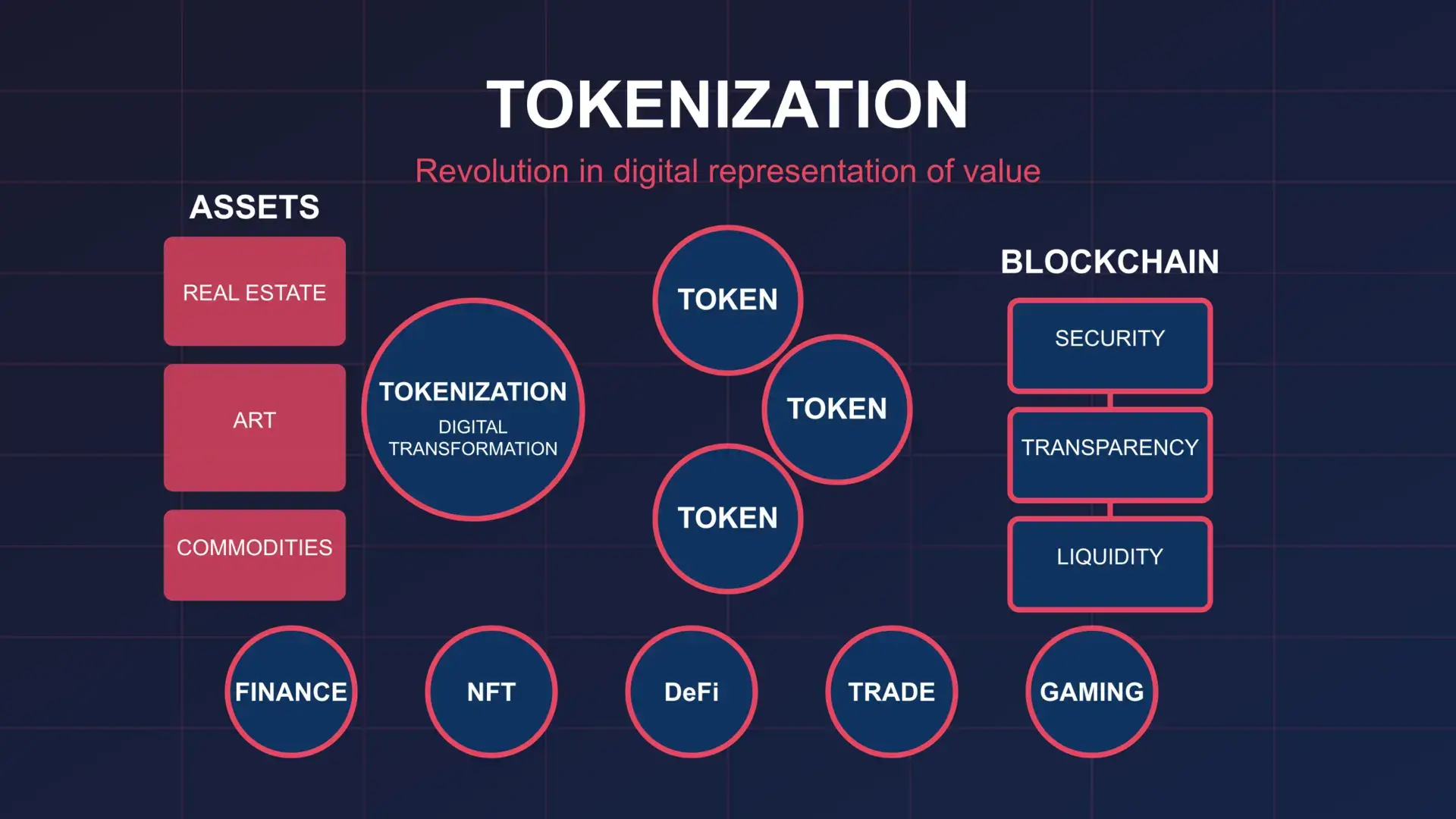Tokenization is the process of transforming rights to assets or units of value into digital tokens that exist on a blockchain. This technology is one of the fundamental components of the financial revolution we’ve been witnessing in recent years, enabling the representation, storage, and exchange of virtually any kind of value in a digital format.
What is Tokenization?
Tokenization is the process of converting rights to assets (physical or digital) into digital tokens, which are recorded and managed on a blockchain. A token represents a specific value or ownership right and can be stored, transferred, or exchanged digitally, without the need to physically move the underlying asset.
In the context of blockchain technology, tokenization uses smart contracts to encode the rules and characteristics of tokens, providing immutability, security, and programmability.
Types of Tokens
Fungible Tokens
These are tokens that have identical value and properties, meaning they can be freely exchanged with one another. Examples include:
- Cryptocurrencies (Bitcoin, Ethereum)
- Utility tokens providing access to specific services
- Tokens representing shares in traditional financial assets
Non-Fungible Tokens (NFTs)
These are unique tokens that cannot be exchanged on a one-to-one basis due to their distinct characteristics. Examples include:
- Digital artworks
- Virtual real estate
- Collectible digital items
- Ownership certificates of unique assets
Security Tokens
These tokens represent traditional securities, such as shares, bonds, or derivatives. They are subject to regulations similar to traditional financial instruments.
Utility Tokens
These provide holders with access to specific products or services on a platform. They are not direct investments but rather “fuel” for using a particular ecosystem.
Applications of Tokenization
Financial Market
Tokenization is revolutionizing traditional financial markets by:
- Fractionalizing high-value assets (e.g., real estate, artwork)
- Increasing liquidity for traditionally illiquid assets
- Reducing transaction costs and eliminating intermediaries
- Automating dividend payouts and other investor entitlements
- Enabling 24/7 trading without geographic restrictions
Real Estate Market
Tokenizing real estate allows for:
- Purchasing shares in real estate from small amounts
- Increasing liquidity of property investments
- Automatically settling rental income
- Global real estate investment without legal or geographic barriers
Art and Collectibles
Tokenization in the art world enables:
- Digital confirmation of authenticity and provenance
- Fractional ownership of valuable artworks
- New business models for artists (e.g., royalties on resales)
- Global access to the art market
Identity and Personal Data
Tokenization can revolutionize identity management by:
- Decentralized digital identity systems
- Selective sharing of personal data
- Monetizing one’s own data on user-defined terms
Supply Chains
In logistics, tokenization enables:
- Product origin tracking
- Automated settlements between supply chain participants
- Verifying product authenticity
Benefits of Tokenization
Increased Liquidity
Tokenization allows assets to be divided into smaller units, significantly boosting their liquidity and accessibility to a broader range of investors.
Global Accessibility
Tokens can be bought and sold by investors around the world, 24/7, without geographic limitations.
Transparency
All transactions are recorded on the blockchain, ensuring full transparency and real-time auditability.
Cost Efficiency
Process automation through smart contracts eliminates intermediaries and reduces transaction costs.
Programmability
Tokens can embed advanced business logic (e.g., automatic dividend payouts, voting rules) through smart contracts.
Challenges and Barriers to Adoption
Legal Regulations
One of the biggest challenges is regulatory uncertainty and the differing approaches of regulators across jurisdictions. Many countries are working on tokenization laws, but the progress is uneven.
Technical Issues
Scalability of blockchains, interoperability between platforms, and smart contract security are significant technical barriers.
Market Acceptance
Educating potential users and investors about the benefits and risks of tokenization remains a challenge to wider adoption.
Integration with Existing Systems
Integrating tokenized assets with traditional financial and legal systems requires comprehensive technical and regulatory solutions.
The Future of Tokenization
The future of tokenization looks promising, with expected growth in the following areas:
- Real-world asset tokenization: Growth in tokenizing real estate, infrastructure, commodities, and other tangible assets.
- Institutional adoption: Banks and financial institutions are increasingly exploring tokenization of traditional assets.
- IP Tokenization: Copyrights, patents, and other forms of intellectual property will be tokenized more frequently.
- Personalized investment baskets: Possibility of creating personalized portfolios composed of shares in various tokenized assets.
- Integration with DeFi: Connecting real-world tokenized assets with decentralized finance protocols.
Summary
Tokenization is a groundbreaking technology with the potential to transform how we perceive ownership, invest, and exchange value. Despite current challenges, its ability to enhance liquidity, reduce costs, and democratize access to various asset classes makes it one of the most promising applications of blockchain technology.
As the market matures, regulatory and technical issues are resolved, and public awareness grows, tokenization could become the standard for managing digital and physical assets, unlocking new opportunities for investors, entrepreneurs, and consumers worldwide.



Leave a Reply